Ewald Prize
![[Ewald Prize medal]](https://www.iucr.org/__data/assets/image/0018/1089/P1000317-copy.gif) The
establishment of the Ewald Prize, for outstanding contributions to the science of crystallography,
was announced in February 1986 and was given wide publicity. The name of the Prize was chosen
with the kind consent of the late Paul Peter Ewald, to recognise Professor Ewald's significant
contributions to the foundations of crystallography and to the founding of the International
Union of Crystallography, especially his services as the President of the Provisional International
Crystallographic Committee from 1946 to 1948, as the first Editor of the IUCr's publication Acta
Crystallographica from 1948 to 1959, and as the President of the IUCr from 1960 to 1963.
The
establishment of the Ewald Prize, for outstanding contributions to the science of crystallography,
was announced in February 1986 and was given wide publicity. The name of the Prize was chosen
with the kind consent of the late Paul Peter Ewald, to recognise Professor Ewald's significant
contributions to the foundations of crystallography and to the founding of the International
Union of Crystallography, especially his services as the President of the Provisional International
Crystallographic Committee from 1946 to 1948, as the first Editor of the IUCr's publication Acta
Crystallographica from 1948 to 1959, and as the President of the IUCr from 1960 to 1963.
Shortly after the death of Professor Ewald, his family informed the President that Professor Ewald had wished to make a bequest to the IUCr. After consulting Mrs Ewald, this generous bequest, together with a donation from the Ewald family and a donation from the IUCr, was used as starting capital for the Ewald Prize. The interest from this capital and further donations from the IUCr are used to finance the Prize.
The Prize consists of a medal, a certificate and a financial award. It is presented once every three years during the triennial International Congresses of Crystallography. The fourteenth Ewald Prize will be presented at the Calgary Congress in August 2026.
To support the IUCr by contributing to the funding of the Ewald Prize, please donate using the button below.
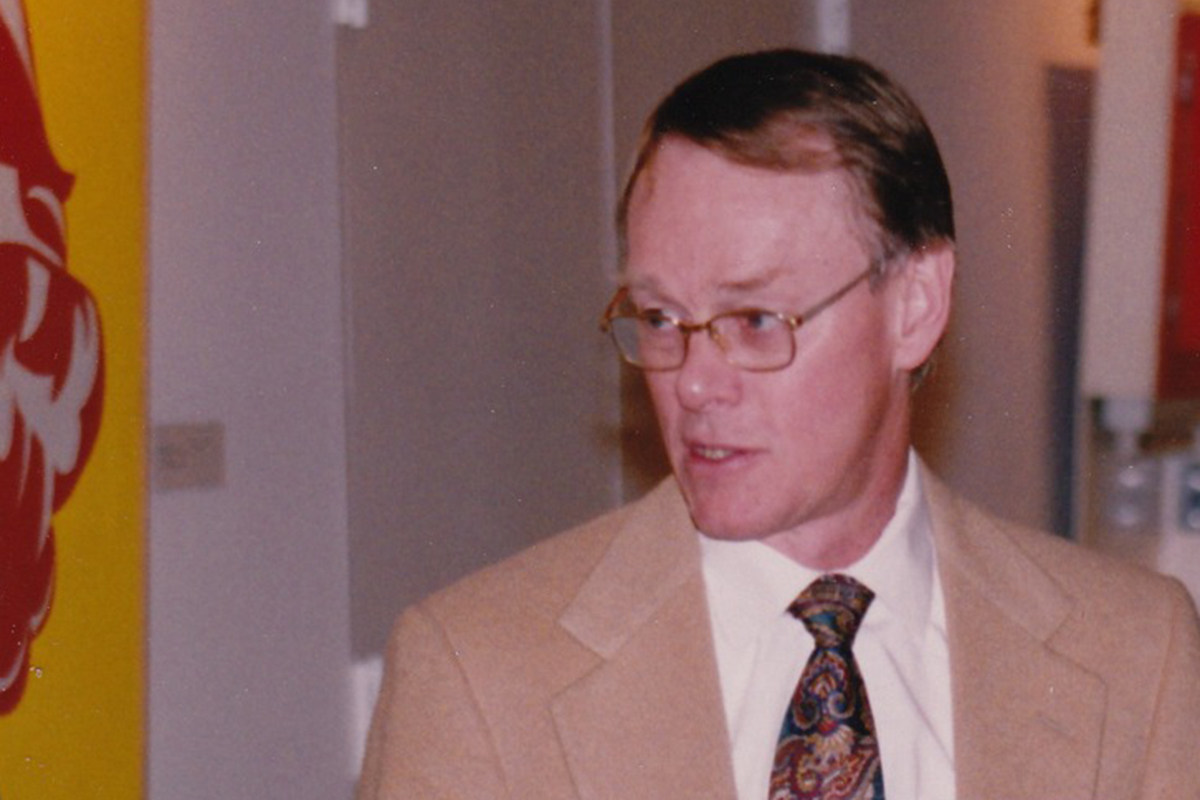
Professor Hendrickson at a 75th birthday celebration for Herbert Hauptman and Jerome Karle in Buffalo, NY, USA, in October 1992 (photo contributed to the IUCr gallery by Bill Duax).
W.A. Hendrickson awarded the 13th Ewald Prize
The 13th Ewald Prize has been awarded to Wayne A. Hendrickson (Columbia University, NY, USA) for his exceptional contribution to structural biology including the development of MAD/SAD methods and crystallographic theory. No-one else is so singularly and formatively identified with the explosive growth in biological crystallography and the consequent benefits to chemistry and biology.
Wayne Hendrickson transformed structural biology when he discovered and perfected resonant diffraction methods for determining the atomic-level structures of biological molecules, namely the methods of MAD (multiwavelength anomalous diffraction) and its single-wavelength variation SAD, which are now “household” terms in the field of crystallography. MAD and SAD derive from a marriage of chemistry with physics and biology and are the methods of choice for de novo X-ray determinations where there is no structural precedent. The ease with which macromolecular structures are determined by these methods served in founding the field of structural genomics, and has led to a flood of atomic-level molecular hypotheses, including many from Hendrickson himself, to inform biochemistry, physiology and genomics.
Like the late Professor Ewald, Hendrickson advanced the foundations of crystallography; his essential contributions include not only MAD and SAD but also his phase-encoding coefficients (Hendrickson–Lattman coefficients) and stereochemically restrained refinement.Professor Hendrickson will deliver the Ewald Prize Lecture during the Opening Ceremony of the 26th IUCr Congress on 22 August 2023.
For a list of papers by Professor Hendrickson appearing in IUCr journals click here.
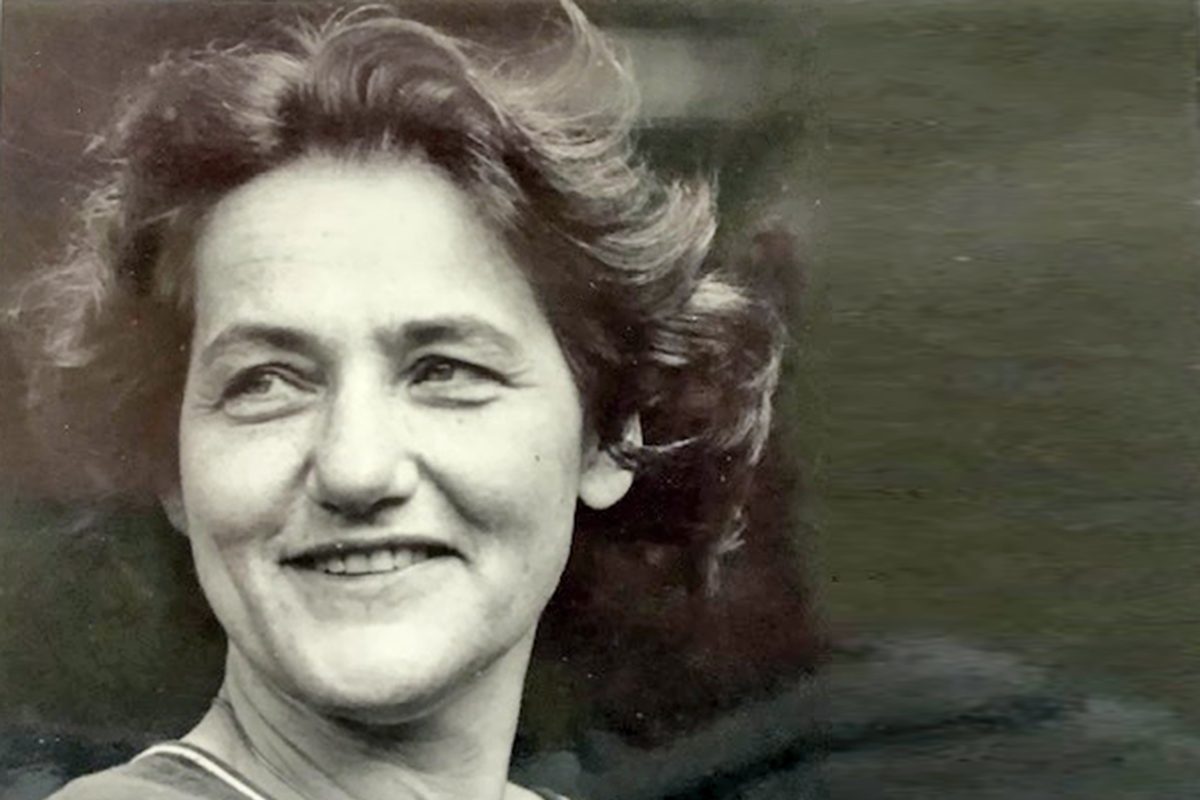
O. Kennard awarded the twelfth Ewald Prize
The twelfth Ewald Prize has been awarded to Dr Olga Kennard (Cambridge, UK) for her invaluable pioneering contribution to the development of crystallographic databases, in particular the Cambridge Structural Database (CSD), which as she early foresaw, has led "… to the discovery of new knowledge which transcends the results of individual experiment". Her own surveys using the CSD were fundamental in the development of crystal engineering, and are outstanding examples of the use of crystallographic databases as an essential tool for analysis and prediction. As founder of the CSD, director of the Cambridge Crystallographic Data Centre (CCDC) over decades, and being involved in the founding of the Protein Data Bank (PDB), Olga Kennard has made a fundamental impact on the development of modern crystallography.
The CCDC's Suzanna Ward delivered Dr Kennard's Ewald Prize Lecture during the Opening Ceremony of the 25th IUCr Congress on 14 August 2021.
The IUCr asked Dr Kennard about her life and work; read her account here.
For a list of papers by Dr Kennard appearing in IUCr journals click here. She also published a paper in the second issue of Acta Crystallographica in 1948 under her maiden name, Weisz.
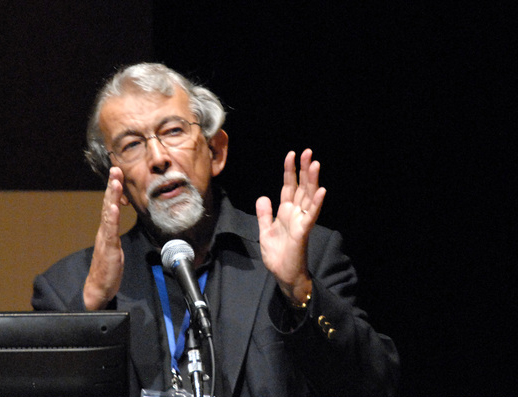
Sir Tom Blundell.
T. Blundell awarded the eleventh Ewald Prize
The eleventh Ewald Prize has been awarded to Professor Sir Tom Blundell (Department of Biochemistry, University of Cambridge, UK) for his work as one of the worldwide leaders in crystallographic innovation, especially at the interface with life sciences; starting with his work on determining the structure of insulin with Dorothy Hodgkin, he determined an exceptionally broad array of medically critical human protein structures, championing methods enabling drug design and discovery through structural optimization, crystallographic fragment screening, and computational modelling, and for being a leader in advanced crystallographic education internationally.The presentation of the Ewald Prize was made during the Hyderabad Congress Opening Ceremony on 21 August 2017.
For a list of papers by Professor Sir Tom Blundell appearing in IUCr journals click here.
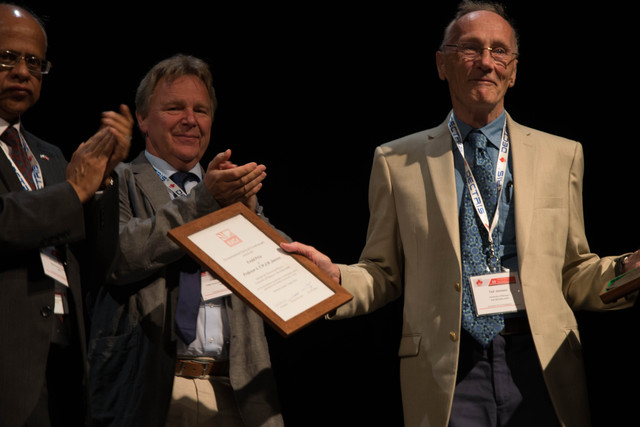
Professor Ted Janssen receives the certificate and medal of the Ewald Prize from IUCr President Gautam Desiraju and Vice-President Claude Lecomte. Professor Aloysio Janner was unable to attend the ceremony at the Montreal Congress.
A. Janner and T.W.J.M. Janssen awarded the tenth Ewald Prize
The tenth Ewald Prize has been awarded to Professors A. Janner and T.W.J.M. Janssen (both from the Institute for Theoretical Physics, University of Nijmegen, The Netherlands) for the development of superspace crystallography and its application to the analysis of aperiodic crystals.The presentation of the Ewald Prize will be made during the Montreal Congress Opening Ceremony on 5 August 2014.
For a list of papers by Professor Janner appearing in IUCr journals click here.
For a list of papers by Professor Janssen appearing in IUCr journals click here.
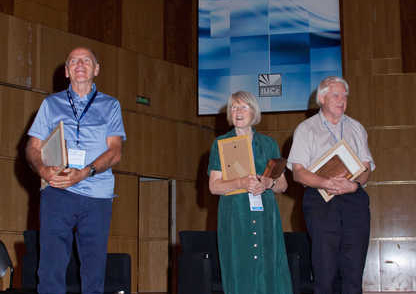
C. Giacovazzo, E. Dodson, G.M. Sheldrick.
E. Dodson, C. Giacovazzo and G.M. Sheldrick awarded the ninth Ewald Prize
The ninth Ewald Prize has been awarded to Professor E. Dodson (Department of Chemistry, University of York, UK), Professor C. Giacovazzo (Institute of Crystallography - CNR, Bari, Italy) and Professor G.M. Sheldrick (Lehrstuhl für Strukturchemie, Göttingen, Germany) for the enormous impact they have made on structural crystallography through the development of new methods that have then been made available to users as constantly maintained and extended software. Their invaluable contributions to computational crystallography have resulted in the leading program suitesThe presentation of the Ewald Prize was made during the Madrid Congress Opening Ceremony on 22 August 2011.
For a list of papers by Professor Dodson appearing in IUCr journals click here.
For a list of papers by Professor Giacovazzo appearing in IUCr journals click here.
For a list of papers by Professor Sheldrick appearing in IUCr journals click here.
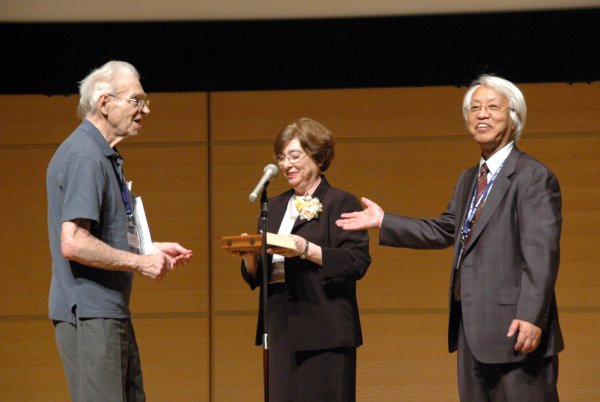
Professor D. Sayre receives the certificate and medal of the 8th Ewald Prize from I. Torriani and Y. Ohashi
D. Sayre awarded the eighth Ewald Prize
The eighth Ewald Prize has been awarded to Dr D. Sayre (Department of Physics, State University of New York, Stony Brook, NY 11794, USA) for the unique breadth of his contributions to crystallography, which range from seminal contributions to the solving of the phase problem to the complex physics of imaging generic objects by X-ray diffraction and microscopy, and for never losing touch with the physical reality of the processes involved.The presentation of the Ewald Prize was made during the Osaka Congress Opening Ceremony in August 2008.
For a list of papers by Dr Sayre appearing in IUCr journals click here.
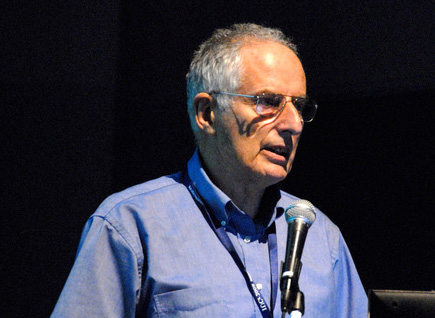
Philip Coppens.
P. Coppens awarded the seventh Ewald Prize
In 2005 it was announced that the seventh Ewald Prize had been awarded to Professor P. Coppens (Department of Chemistry, State University of New York at Buffalo, USA) for his contributions to developing the fields of electron density determination and the crystallography of molecular excited states, and for his contributions to the education and inspiration of young crystallographers as an enthusiastic teacher by participating in and organizing many courses and workshops.The presentation of the Ewald Prize was made during the Florence Congress Opening Ceremony in August 2005.
For a list of papers by Professor Coppens appearing in IUCr journals click here.
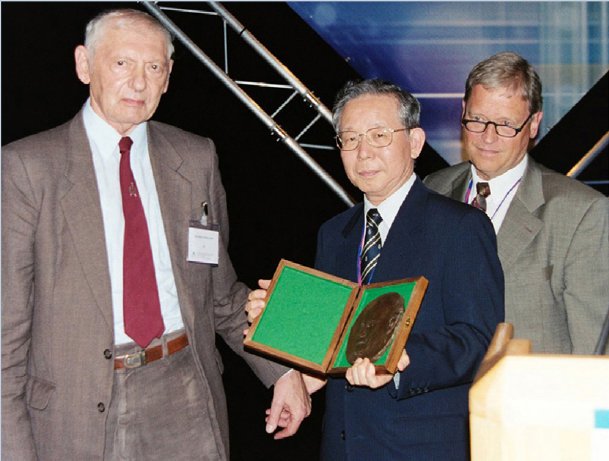
Michael Woolfson is awarded the sixth Ewald Prize at the Opening Ceremony of the IUCr Congress in Geneva.
M.M. Woolfson awarded the sixth Ewald Prize
In 2002 it was announced that the sixth Ewald Prize had been awarded to Professor Michael M. Woolfson (Physics Department, University of York, York, UK) for his exceptional contributions in developing the conceptual and theoretical framework of direct methods along with the algorithm design and computer programs for automatic solutions that changed the face of structural science and for his contributions to crystallographic education and international collaboration, which have strengthened the intellectual development of crystallographers worldwide.The presentation of the Ewald Prize was made during the Geneva Congress Opening Ceremony in August 2002.
For a list of papers by Professor Woolfson appearing in IUCr journals click here.
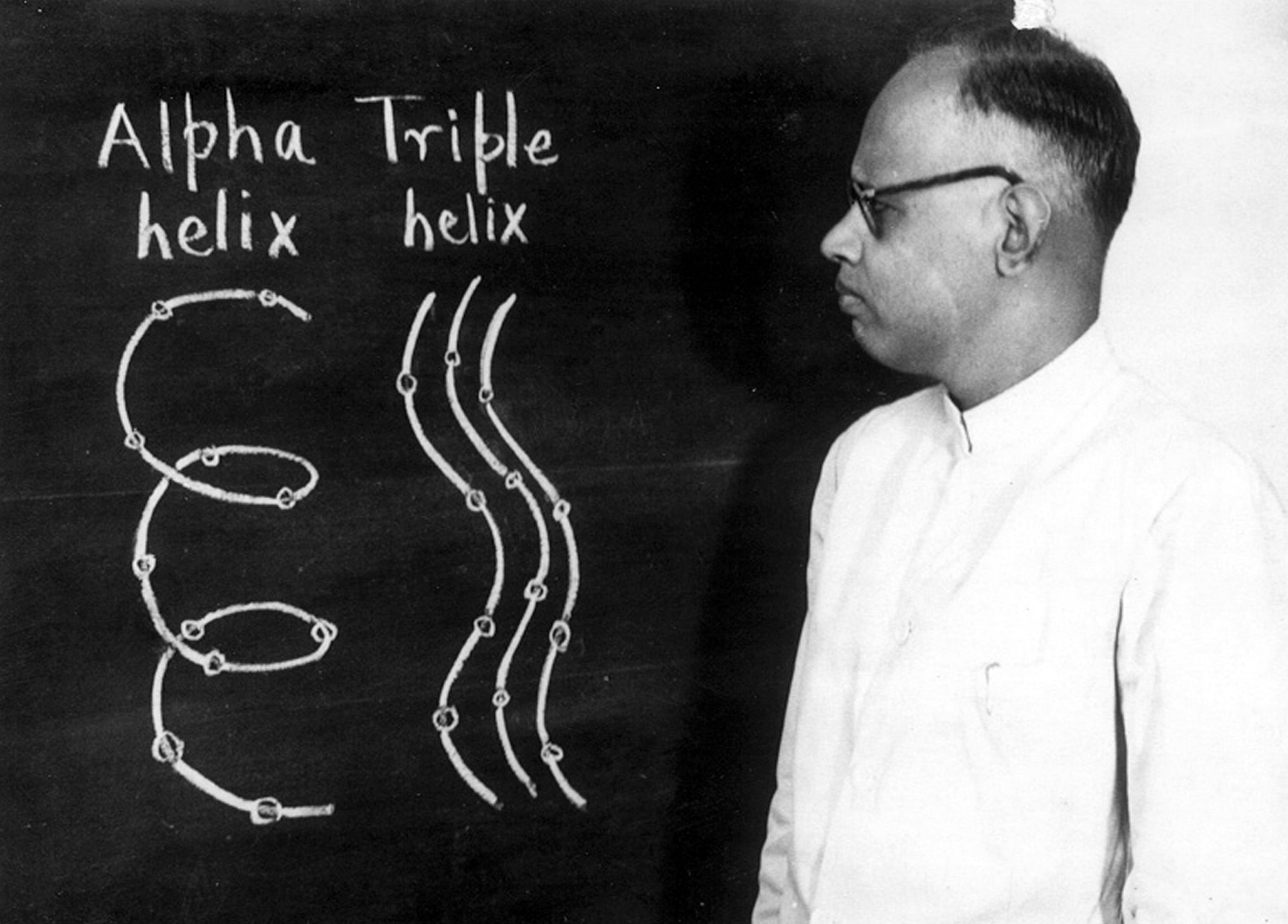
G.N. Ramachandran delivering a seminar in the 1960s.
G.N. Ramachandran awarded the fifth Ewald Prize
In 1999 it was announced that the fifth Ewald Prize had been awarded to Professor G.N. Ramachandran for his outstanding contributions to the field of crystallography: in the area of anomalous scattering and its use in the solution of the phase problem, in the analysis of the structure of fibres, collagen in particular, and, foremost, for his fundamental works on the macromolecular conformation and the validation of macromolecular structures by means of the 'Ramachandran plot', which even today remains the most useful validation tool.The presentation of the Ewald Prize was made during the Glasgow Congress Opening Ceremony in August 1999.
For a list of papers by Professor Ramachandran appearing in IUCr journals click here.

Michael Rossmann.
M.G. Rossmann awarded the fourth Ewald Prize
In March 1996, it was announced that the fourth Ewald Prize had been awarded to Professor M. G. Rossmann (Department of Biological Sciences, Purdue University, West Lafayette, Indiana, USA) for his work on molecular replacement and the use of non-crystallographic symmetry in the determination of macromolecular structure and for his research on the structure of viruses, which is foremost among the triumphs of crystallography.The presentation of the Ewald Prize was made during the Seattle Congress Opening Ceremony in August 1996.
For a list of papers by Professor Rossmann appearing in IUCr journals click here.
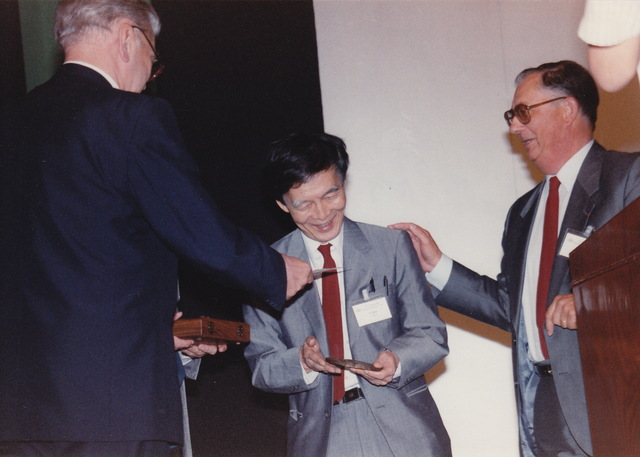
The Third Ewald Prize was awarded to Norio Kato, Department of Physics, Meijo U., Nagoya, Japan for his fundamental contributions to the field of electron diffraction. Presented by IUCr Treasurer Asbjørn Hordvik and President André Authier.
N. Kato awarded the third Ewald Prize
In April 1993 it was announced that the third Ewald Prize had been awarded to Professor N. Kato (Department of Physics, Meijo University, Nagoya, Japan) for his outstanding and profound contributions to the dynamical theory of X-ray diffraction of spherical waves by perfect crystals and slightly deformed (nearly perfect) crystals, for the experimental exploitation of these theories towards the characterization of the defect structure of single crystals and for his extraordinary achievements in X-ray diffraction topography.The presentation of the Ewald Prize was made during the Beijing Congress Opening Ceremony in August 1993.
For a list of papers by Professor Kato appearing in IUCr journals click here.
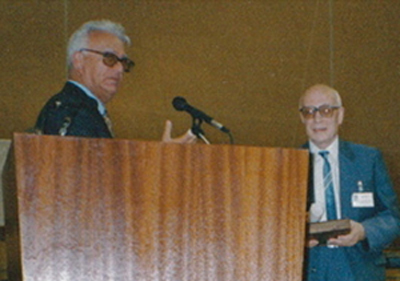
Presentation by President Mario Nardelli of the Ewald Prize to Boris Vainshtein at the Opening Ceremony of the 1990 Bordeaux Congress.
B.K. Vainshtein awarded the second Ewald Prize
In 1990 it was announced that the second Ewald Prize had been awarded to Professor B.K. Vainshtein (Institute of Crystallography, Academy of Sciences, Moscow, Russia) for his contributions to the development of theories and methods of structure analysis by electron and X-ray diffraction and for his applications of his theories to structural investigations of polymers, liquid crystals, peptides and proteins.The presentation of the Ewald Prize was made during the Bordeaux Congress Opening Ceremony in August 1990.
For a list of papers by Professor Vainshtein appearing in IUCr journals click here.
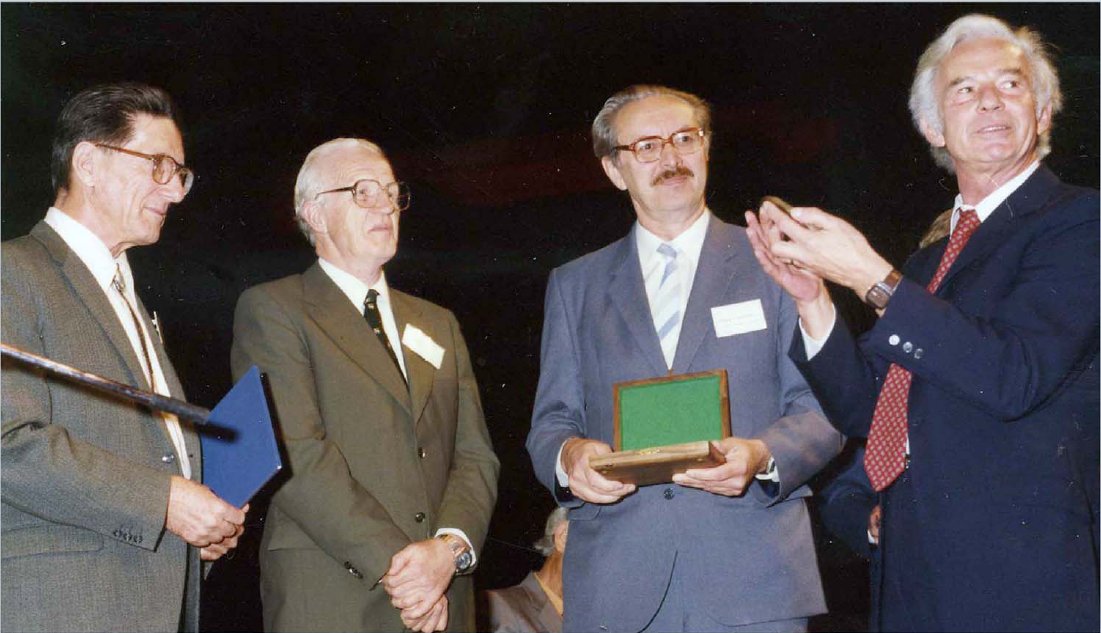
Presentation of the Ewald Prize to John Cowley and Alex Moodie at the Opening Ceremony of the 1987 Perth Congress. Left-right: John Cowley, Alex Moodie, V. I. Simonov, Theo Hahn.
J.M. Cowley and A.F. Moodie awarded the first Ewald Prize
In 1987 it was announced that the first Ewald Prize had been awarded to Professor J.M. Cowley (Tempe, Arizona, USA) and Dr A.F. Moodie (Clayton, Victoria, Australia) for their outstanding achievements in electron diffraction and microscopy. They carried out pioneering work on the dynamical scattering of electrons and the direct imaging of crystal structures and structure defects by high-resolution electron microscopy. The physical optics approach used by Cowley and Moodie takes into account many hundreds of scattered beams, and represents a far-reaching extension of the dynamical theory for X-rays, first developed by P.P. Ewald.
The presentation of the Ewald Prize was made during the Perth Congress Opening Ceremony in August 1987.
For a list of papers by Professor Cowley appearing in IUCr journals click here.
For a list of papers by Professor Moodie appearing in IUCr journals click here.
Ewald Prize
![[Ewald Prize medal]](https://www.iucr.org/__data/assets/image/0018/1089/P1000317-copy.gif) The
establishment of the Ewald Prize, for outstanding contributions to the science of crystallography,
was announced in February 1986 and was given wide publicity. The name of the Prize was chosen
with the kind consent of the late Paul Peter Ewald, to recognise Professor Ewald's significant
contributions to the foundations of crystallography and to the founding of the International
Union of Crystallography, especially his services as the President of the Provisional International
Crystallographic Committee from 1946 to 1948, as the first Editor of the IUCr's publication Acta
Crystallographica from 1948 to 1959, and as the President of the IUCr from 1960 to 1963.
The
establishment of the Ewald Prize, for outstanding contributions to the science of crystallography,
was announced in February 1986 and was given wide publicity. The name of the Prize was chosen
with the kind consent of the late Paul Peter Ewald, to recognise Professor Ewald's significant
contributions to the foundations of crystallography and to the founding of the International
Union of Crystallography, especially his services as the President of the Provisional International
Crystallographic Committee from 1946 to 1948, as the first Editor of the IUCr's publication Acta
Crystallographica from 1948 to 1959, and as the President of the IUCr from 1960 to 1963.
Shortly after the death of Professor Ewald, his family informed the President that Professor Ewald had wished to make a bequest to the IUCr. After consulting Mrs Ewald, this generous bequest, together with a donation from the Ewald family and a donation from the IUCr, was used as starting capital for the Ewald Prize. The interest from this capital and further donations from the IUCr are used to finance the Prize.
The Prize consists of a medal, a certificate and a financial award. It is presented once every three years during the triennial International Congresses of Crystallography. The fourteenth Ewald Prize will be presented at the Calgary Congress in August 2026.
To support the IUCr by contributing to the funding of the Ewald Prize, please donate using the button below.

Professor Hendrickson at a 75th birthday celebration for Herbert Hauptman and Jerome Karle in Buffalo, NY, USA, in October 1992 (photo contributed to the IUCr gallery by Bill Duax).
W.A. Hendrickson awarded the 13th Ewald Prize
The 13th Ewald Prize has been awarded to Wayne A. Hendrickson (Columbia University, NY, USA) for his exceptional contribution to structural biology including the development of MAD/SAD methods and crystallographic theory. No-one else is so singularly and formatively identified with the explosive growth in biological crystallography and the consequent benefits to chemistry and biology.
Wayne Hendrickson transformed structural biology when he discovered and perfected resonant diffraction methods for determining the atomic-level structures of biological molecules, namely the methods of MAD (multiwavelength anomalous diffraction) and its single-wavelength variation SAD, which are now “household” terms in the field of crystallography. MAD and SAD derive from a marriage of chemistry with physics and biology and are the methods of choice for de novo X-ray determinations where there is no structural precedent. The ease with which macromolecular structures are determined by these methods served in founding the field of structural genomics, and has led to a flood of atomic-level molecular hypotheses, including many from Hendrickson himself, to inform biochemistry, physiology and genomics.
Like the late Professor Ewald, Hendrickson advanced the foundations of crystallography; his essential contributions include not only MAD and SAD but also his phase-encoding coefficients (Hendrickson–Lattman coefficients) and stereochemically restrained refinement.Professor Hendrickson will deliver the Ewald Prize Lecture during the Opening Ceremony of the 26th IUCr Congress on 22 August 2023.
For a list of papers by Professor Hendrickson appearing in IUCr journals click here.

O. Kennard awarded the twelfth Ewald Prize
The twelfth Ewald Prize has been awarded to Dr Olga Kennard (Cambridge, UK) for her invaluable pioneering contribution to the development of crystallographic databases, in particular the Cambridge Structural Database (CSD), which as she early foresaw, has led "… to the discovery of new knowledge which transcends the results of individual experiment". Her own surveys using the CSD were fundamental in the development of crystal engineering, and are outstanding examples of the use of crystallographic databases as an essential tool for analysis and prediction. As founder of the CSD, director of the Cambridge Crystallographic Data Centre (CCDC) over decades, and being involved in the founding of the Protein Data Bank (PDB), Olga Kennard has made a fundamental impact on the development of modern crystallography.
The CCDC's Suzanna Ward delivered Dr Kennard's Ewald Prize Lecture during the Opening Ceremony of the 25th IUCr Congress on 14 August 2021.
The IUCr asked Dr Kennard about her life and work; read her account here.
For a list of papers by Dr Kennard appearing in IUCr journals click here. She also published a paper in the second issue of Acta Crystallographica in 1948 under her maiden name, Weisz.

Sir Tom Blundell.
T. Blundell awarded the eleventh Ewald Prize
The eleventh Ewald Prize has been awarded to Professor Sir Tom Blundell (Department of Biochemistry, University of Cambridge, UK) for his work as one of the worldwide leaders in crystallographic innovation, especially at the interface with life sciences; starting with his work on determining the structure of insulin with Dorothy Hodgkin, he determined an exceptionally broad array of medically critical human protein structures, championing methods enabling drug design and discovery through structural optimization, crystallographic fragment screening, and computational modelling, and for being a leader in advanced crystallographic education internationally.The presentation of the Ewald Prize was made during the Hyderabad Congress Opening Ceremony on 21 August 2017.
For a list of papers by Professor Sir Tom Blundell appearing in IUCr journals click here.

Professor Ted Janssen receives the certificate and medal of the Ewald Prize from IUCr President Gautam Desiraju and Vice-President Claude Lecomte. Professor Aloysio Janner was unable to attend the ceremony at the Montreal Congress.
A. Janner and T.W.J.M. Janssen awarded the tenth Ewald Prize
The tenth Ewald Prize has been awarded to Professors A. Janner and T.W.J.M. Janssen (both from the Institute for Theoretical Physics, University of Nijmegen, The Netherlands) for the development of superspace crystallography and its application to the analysis of aperiodic crystals.The presentation of the Ewald Prize will be made during the Montreal Congress Opening Ceremony on 5 August 2014.
For a list of papers by Professor Janner appearing in IUCr journals click here.
For a list of papers by Professor Janssen appearing in IUCr journals click here.

C. Giacovazzo, E. Dodson, G.M. Sheldrick.
E. Dodson, C. Giacovazzo and G.M. Sheldrick awarded the ninth Ewald Prize
The ninth Ewald Prize has been awarded to Professor E. Dodson (Department of Chemistry, University of York, UK), Professor C. Giacovazzo (Institute of Crystallography - CNR, Bari, Italy) and Professor G.M. Sheldrick (Lehrstuhl für Strukturchemie, Göttingen, Germany) for the enormous impact they have made on structural crystallography through the development of new methods that have then been made available to users as constantly maintained and extended software. Their invaluable contributions to computational crystallography have resulted in the leading program suitesThe presentation of the Ewald Prize was made during the Madrid Congress Opening Ceremony on 22 August 2011.
For a list of papers by Professor Dodson appearing in IUCr journals click here.
For a list of papers by Professor Giacovazzo appearing in IUCr journals click here.
For a list of papers by Professor Sheldrick appearing in IUCr journals click here.

Professor D. Sayre receives the certificate and medal of the 8th Ewald Prize from I. Torriani and Y. Ohashi
D. Sayre awarded the eighth Ewald Prize
The eighth Ewald Prize has been awarded to Dr D. Sayre (Department of Physics, State University of New York, Stony Brook, NY 11794, USA) for the unique breadth of his contributions to crystallography, which range from seminal contributions to the solving of the phase problem to the complex physics of imaging generic objects by X-ray diffraction and microscopy, and for never losing touch with the physical reality of the processes involved.The presentation of the Ewald Prize was made during the Osaka Congress Opening Ceremony in August 2008.
For a list of papers by Dr Sayre appearing in IUCr journals click here.

Philip Coppens.
P. Coppens awarded the seventh Ewald Prize
In 2005 it was announced that the seventh Ewald Prize had been awarded to Professor P. Coppens (Department of Chemistry, State University of New York at Buffalo, USA) for his contributions to developing the fields of electron density determination and the crystallography of molecular excited states, and for his contributions to the education and inspiration of young crystallographers as an enthusiastic teacher by participating in and organizing many courses and workshops.The presentation of the Ewald Prize was made during the Florence Congress Opening Ceremony in August 2005.
For a list of papers by Professor Coppens appearing in IUCr journals click here.

Michael Woolfson is awarded the sixth Ewald Prize at the Opening Ceremony of the IUCr Congress in Geneva.
M.M. Woolfson awarded the sixth Ewald Prize
In 2002 it was announced that the sixth Ewald Prize had been awarded to Professor Michael M. Woolfson (Physics Department, University of York, York, UK) for his exceptional contributions in developing the conceptual and theoretical framework of direct methods along with the algorithm design and computer programs for automatic solutions that changed the face of structural science and for his contributions to crystallographic education and international collaboration, which have strengthened the intellectual development of crystallographers worldwide.The presentation of the Ewald Prize was made during the Geneva Congress Opening Ceremony in August 2002.
For a list of papers by Professor Woolfson appearing in IUCr journals click here.

G.N. Ramachandran delivering a seminar in the 1960s.
G.N. Ramachandran awarded the fifth Ewald Prize
In 1999 it was announced that the fifth Ewald Prize had been awarded to Professor G.N. Ramachandran for his outstanding contributions to the field of crystallography: in the area of anomalous scattering and its use in the solution of the phase problem, in the analysis of the structure of fibres, collagen in particular, and, foremost, for his fundamental works on the macromolecular conformation and the validation of macromolecular structures by means of the 'Ramachandran plot', which even today remains the most useful validation tool.The presentation of the Ewald Prize was made during the Glasgow Congress Opening Ceremony in August 1999.
For a list of papers by Professor Ramachandran appearing in IUCr journals click here.

Michael Rossmann.
M.G. Rossmann awarded the fourth Ewald Prize
In March 1996, it was announced that the fourth Ewald Prize had been awarded to Professor M. G. Rossmann (Department of Biological Sciences, Purdue University, West Lafayette, Indiana, USA) for his work on molecular replacement and the use of non-crystallographic symmetry in the determination of macromolecular structure and for his research on the structure of viruses, which is foremost among the triumphs of crystallography.The presentation of the Ewald Prize was made during the Seattle Congress Opening Ceremony in August 1996.
For a list of papers by Professor Rossmann appearing in IUCr journals click here.

The Third Ewald Prize was awarded to Norio Kato, Department of Physics, Meijo U., Nagoya, Japan for his fundamental contributions to the field of electron diffraction. Presented by IUCr Treasurer Asbjørn Hordvik and President André Authier.
N. Kato awarded the third Ewald Prize
In April 1993 it was announced that the third Ewald Prize had been awarded to Professor N. Kato (Department of Physics, Meijo University, Nagoya, Japan) for his outstanding and profound contributions to the dynamical theory of X-ray diffraction of spherical waves by perfect crystals and slightly deformed (nearly perfect) crystals, for the experimental exploitation of these theories towards the characterization of the defect structure of single crystals and for his extraordinary achievements in X-ray diffraction topography.The presentation of the Ewald Prize was made during the Beijing Congress Opening Ceremony in August 1993.
For a list of papers by Professor Kato appearing in IUCr journals click here.

Presentation by President Mario Nardelli of the Ewald Prize to Boris Vainshtein at the Opening Ceremony of the 1990 Bordeaux Congress.
B.K. Vainshtein awarded the second Ewald Prize
In 1990 it was announced that the second Ewald Prize had been awarded to Professor B.K. Vainshtein (Institute of Crystallography, Academy of Sciences, Moscow, Russia) for his contributions to the development of theories and methods of structure analysis by electron and X-ray diffraction and for his applications of his theories to structural investigations of polymers, liquid crystals, peptides and proteins.The presentation of the Ewald Prize was made during the Bordeaux Congress Opening Ceremony in August 1990.
For a list of papers by Professor Vainshtein appearing in IUCr journals click here.

Presentation of the Ewald Prize to John Cowley and Alex Moodie at the Opening Ceremony of the 1987 Perth Congress. Left-right: John Cowley, Alex Moodie, V. I. Simonov, Theo Hahn.
J.M. Cowley and A.F. Moodie awarded the first Ewald Prize
In 1987 it was announced that the first Ewald Prize had been awarded to Professor J.M. Cowley (Tempe, Arizona, USA) and Dr A.F. Moodie (Clayton, Victoria, Australia) for their outstanding achievements in electron diffraction and microscopy. They carried out pioneering work on the dynamical scattering of electrons and the direct imaging of crystal structures and structure defects by high-resolution electron microscopy. The physical optics approach used by Cowley and Moodie takes into account many hundreds of scattered beams, and represents a far-reaching extension of the dynamical theory for X-rays, first developed by P.P. Ewald.
The presentation of the Ewald Prize was made during the Perth Congress Opening Ceremony in August 1987.
For a list of papers by Professor Cowley appearing in IUCr journals click here.
For a list of papers by Professor Moodie appearing in IUCr journals click here.

